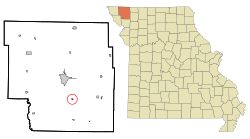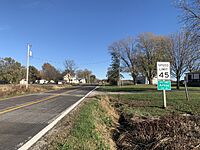Arkoe, Missouri facts for kids
Quick facts for kids
Arkoe, Missouri
|
|
|---|---|

Location of Arkoe, Missouri
|
|
| Country | United States |
| State | Missouri |
| County | Nodaway |
| Township | White Cloud |
| Area | |
| • Total | 0.13 sq mi (0.33 km2) |
| • Land | 0.13 sq mi (0.33 km2) |
| • Water | 0.00 sq mi (0.00 km2) |
| Elevation | 984 ft (300 m) |
| Population
(2020)
|
|
| • Total | 56 |
| • Density | 440.94/sq mi (170.01/km2) |
| Time zone | UTC-6 (Central (CST)) |
| • Summer (DST) | UTC-5 (CDT) |
| FIPS code | 29-01864 |
| GNIS feature ID | 2397438 |
Arkoe is a small village located in the middle-southern part of Nodaway County, Missouri, in the United States. In 2020, the village had a population of 56 people.
Contents
Geography of Arkoe
Arkoe is a small village in Missouri. It covers about 0.13 square miles (0.33 square kilometers) of land. The village is located on a very flat plain near the One Hundred and Two River.
Arkoe is six miles north of Barnard. It is also six miles southeast of Maryville. The village is 7.5 miles west of Conception.
What Does "Arkoe" Mean?
The exact reason why this community was named Arkoe is not fully known. There are only two places named Arkoe in the United States. The other one is in Pike County, Ohio.
One idea for the name comes from an old fantasy book. This book, "The Life and Adventures of Peter Wilkins," was written in 1751 by Robert Paltock. In the story, an "Arkoe" is described as "water surrounded with wood." Since Arkoe, Missouri, is next to the One Hundred and Two River, some people think this might be why it got its name.
The book is about a sailor who gets shipwrecked on a mysterious island. This island is home to flying people. The story is an early example of science fiction. It was even turned into a play in London in 1846.
An old history book from 1882 incorrectly said the name came from a Jules Verne novel. However, the name "Arkoe" is not found in the book "Twenty Thousand Leagues Under the Seas".
History of Arkoe
The first community in this area was called Bridgewater. It was about one mile north of where Arkoe is today. In 1870, the first railroad in Nodaway County built two bridges over the 102 River. A road bridge was also built between them. The railroad then planned the community of Bridgewater near these bridges. A post office opened there.
Dr. Perry H. Talbott owned much of the land in the area. He wanted the town to be on his property. So, on September 16, 1874, he and S.K. Snively officially planned out the village of Arkoe.
The first business in Arkoe was a store owned by Nelson Wilson. He moved his store from Bridgewater to Arkoe in 1874. Other businesses soon followed, and the railroad also moved its station to Arkoe.
In 1880, Dr. Talbott died at his home. His wife and two sons were suspected. His sons, Charles Edward and Albert Perry, were later found guilty. They were executed in Maryville on July 22, 1881. Many people came to witness this event. This was said to be the first "legal" hanging in Nodaway County.
Arkoe officially became an incorporated village in 1906. This means it became a recognized town with its own local government. The Arkoe post office closed in 1953. The train line that ran through Arkoe stopped operating by 1979.
Population of Arkoe
The population of Arkoe has changed over the years. Here is a look at how many people have lived in the village during different census years:
| Historical population | |||
|---|---|---|---|
| Census | Pop. | %± | |
| 1880 | 33 | — | |
| 1910 | 87 | — | |
| 1920 | 132 | 51.7% | |
| 1930 | 99 | −25.0% | |
| 1940 | 73 | −26.3% | |
| 1950 | 48 | −34.2% | |
| 1960 | 36 | −25.0% | |
| 1970 | 49 | 36.1% | |
| 1980 | 63 | 28.6% | |
| 1990 | 64 | 1.6% | |
| 2000 | 58 | −9.4% | |
| 2010 | 68 | 17.2% | |
| 2020 | 56 | −17.6% | |
| U.S. Decennial Census | |||
2010 Census Information
In 2010, there were 68 people living in Arkoe. These people lived in 23 households. About 16 of these households were families. The village had a population density of about 485 people per square mile.
Most of the people living in Arkoe were White. About 52% of households had children under 18 living with them. About 56% of households were married couples. The average household had almost 3 people.
The average age of people in the village was 31.5 years. About 40% of residents were under 18 years old. The number of males and females in the village was about equal.
See also
 In Spanish: Arkoe (Misuri) para niños
In Spanish: Arkoe (Misuri) para niños
 | James B. Knighten |
 | Azellia White |
 | Willa Brown |


